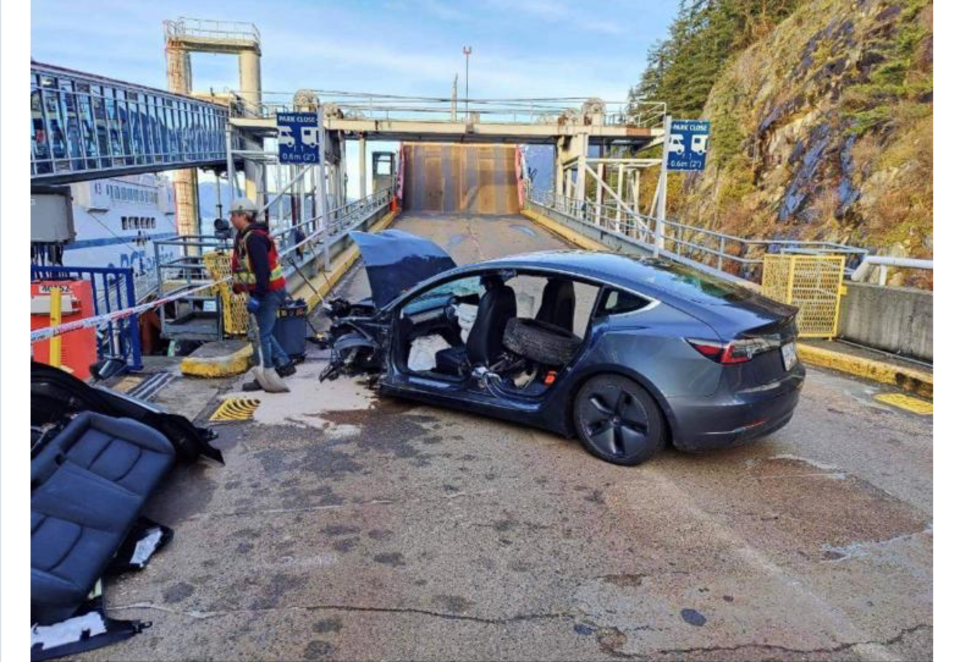An investigation into an electric vehicle fire in which a Tesla caught fire while it was being driven in North Vancouver has ruled out the car battery as a cause of the blaze, according to Transport Canada.
In May, Jamil Jutha was stopped at a light at the intersection of Mountain Highway and Hunter Street in North Vancouver when all of a sudden his vehicle felt as though it lost all power.
Jutha told the North Shore News he tried to put on his hazard lights, but they didn’t work. That was when he noticed smoke coming into the car through the driver’s side vent, said Jutha.
Jutha said he tried to open his door with the electronic button and roll down his windows, but those didn’t work either.
As smoke began filling the car, he panicked and kicked out the driver’s side window.
Jutha said once out of the vehicle, he immediately called 911. Within two or three minutes, he said, the whole car was on fire. “The whole thing just burst into flames.”
But the electric battery that powers the Tesla wasn’t the cause of the fire, said authorities.
After the fire, the burnt vehicle was inspected twice – on June 8 and Aug. 19, 2022, by Transport Canada inspectors along with ICBC officials, engineering consultants representing ICBC and Tesla representatives. A North Vancouver fire investigator also attended one of the inspections.
“It was confirmed that the fire does not relate to the high-voltage battery in the vehicle, said Sau Sau Liu, spokesperson for Transport Canada.
Investigators determined that the car fire started in the left half of the dashboard, in the vicinity of the “left body control module.”
During the second inspection, several components from under the instrument panel – including the left body control module, the steering column assembly, and the car computer – were removed for more in-depth inspection. The car computer was also retained as it may contain some recorded data that could be helpful, said Liu.
Detailed examination of those components and information from the car’s computer are ongoing, she said.
Liu said Transport Canada is not aware of any other similar incidents of Teslas catching fire while being driven.
After the incident, Jutha said he wanted other Tesla drivers to be made more aware of the emergency door release in the electric vehicles.
While there is a mechanical override to open the driver’s door in a Tesla, Jutha told the North Shore News after the fire he’d never had to use the emergency door release – a latch that the driver can pull up, located under the door panel containing the window controls – in the eight months that he owned the vehicle – a Tesla model Y 2021 – and didn’t know where to find it.
Most of the other Tesla owners he spoke with after the fire also had no clue where the mechanical lever is, said Jutha, adding he wants other Tesla owners to get familiar with the system.
“What if I was an older person who couldn’t kick out the window?” he said. “It was terrifying.”
Tesla crash into BC Ferries ramp still under investigation
A more recent incident involving a Tesla that accelerated and crashed into a ramp at the Horseshoe Bay ferry terminal in West Vancouver Jan. 14 is still under investigation.
In that incident, the vehicle suddenly accelerated into a gate, destroying the Tesla. Both the driver and passenger were taken to hospital for non-life threatening injuries.
A photo of the aftermath shows the Tesla on an upper car ramp but split in two pieces, with its front left wheel detached and airbags deployed.
West Vancouver Police have indicated they do not believe the crash was a result of alcohol or a medical issue. The investigation is now focusing on whether the crash was likely the result of a mechanical malfunction or driver error.
In January 2021, the National Highway Traffic Safety Administration in the U.S. concluded an investigation of sudden accelerations of Tesla vehicles, finding driver error to be the source.
“More than 200 incidents involving Teslas unexpectedly accelerating and crashing were the fault of drivers confusing their brake and accelerator pedals, not a defect with the electric vehicles,” reported the Washington Post.

With files from Graeme Wood
